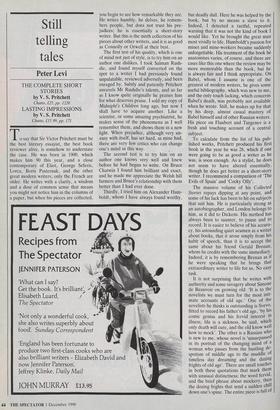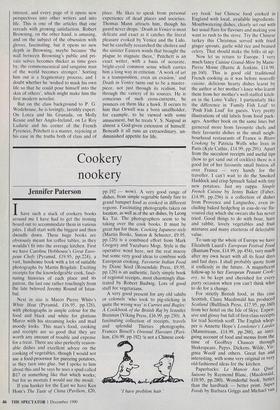Still telling tales
Peter Levi
THE COMPLETE SHORT STORIES by V. S. Pritchett
Chatto, f.25, pp. 1220
LASTING IMPRESSIONS by V. S. Pritchett
Chatto, f15.99, pp. 171
To say that Sir Victor Pritchett must be the best literary essayist, the best book reviewer alive, is somehow to understate the case. He was born in 1900, which makes him 90 this year, and a close contemporary of Eliot, George Seferis, Lorca, Boris Pasternak, and the other great modern writers; only the French are older. He writes with a clarity, a wisdom and a dose of common sense that means you might not notice him in the columns of a paper, but when his pieces are collected,
you begin to see how remarkable they are. He .writes humbly, he delves, he remem- bers people, but does not trust his pre- judices; he is essentially a short-story writer. But this is the ninth collection of his pieces about other writers, and it is as good as Connolly or Orwell at their best.
The first test of his quality, which is one of mind not just of style, is to try him on an author one dislikes. I took Salman Rush- die, and found myself converted on the spot to a writer I had previously found unpalatable, reviewed adversely, and been enraged by. Subtly and patiently Pritchett unravels Mr Rushdie's talents, and so far as I know quite originally he praises him for what deserves praise. I sold my copy of Midnight's Children long ago, but now I shall have to acquire another. Like a scientist, or some amazing psychiatrist, he makes sense of the phenomena as I well remember them, and shows them in a new light. When prejudice, although very un- easy with itself, has set hard, as mine had, there are very few critics who can change one's mind in this way.
The second test is to try him on an author one knows very well and knew before he had begun to write. On Bruce Chatwin I found him brilliant and exact, and he made me appreciate the Welsh hill farmers and Bruce's relationship with them better than I had ever done.
Thirdly, I tried him on Alexander Hum- boldt, whom I have always found worthy, but deadly dull. Here he was helped by the book, but by no means a slave to it. Indeed, I detected a tactful, repeated warning that it was not the kind of book I would like. Yet he brought the great man most vividly to life. Humboldt's passion for mines and mine-workers became suddenly unforgettable. His treatment of the book he anatomises varies, of course, and there are cases like this one where the review may be more memorable than the book, but he is always fair and I think appropriate. On Babel, whom I assume is one of the greatest of modern writers, he gives some useful bibliography, which was new to me, and the only touch lacking, which concerns Babel's death, was probably not available when he wrote. Still, he makes up for that by his deep, almost casual mastery of Babel himself and of other Russian writers. His piece on Flaubert and Turgenev is a fresh and touching account of a central subject.
To calculate from the list of his pub- lished works, Pritchett produced his first book in the year he was 28, which if one were going to be as good a writer as he was, is soon enough. As a stylist, he does not seem to have altered essentially, though he does get better as a short-story writer. I recommend a comparison of 'The Evils of Spain' and 'Cocky 011y'.
The massive volume of his Collected Stories repays dipping at any point, and some of his luck has been to hit on subjects that suit him. He is particularly strong as an autobiographer, and London belongs to him, as it did to Dickens. His method has always been to saunter, to pause and to record. It is easier to believe of his accura- cy, his astounding quiet acumen as a writer about books, that it arose simply from his habit of speech, than it is to accept the same about his friend Gerald Brenan, whom he credits with the same immediacy. Indeed, it is by remembering Brenan as if he were speaking that he brings that extraordinary writer to life for us. No easy task.
It is not surprising that he writes with authority and some savagery about Simone de Beauvoir on growing old. 'It is to the novelists we must turn for the most inti- mate accounts of old age.' One of the novelists he thinks is outstanding is Svevo, fitted to record his father's old age, 'by his comic genius and his fervid interest in illness; life is a sickness, he said, which only death will cure, and the old know well how to mock'. The other is a Russian who is new to me, whose novel is 'unsurpassed in its portrait of the changing mind of a woman who passes from the bustling de- spotism of middle age to the muddle of timeless day dreaming and the dazing frights of old age'. There are small touches in both these quotations that mark them with unusual distinctness: the word fervid, and the brief phrase about mockery, then the dozing frights that send a sudden chill down one's spine. The entire piece is full of
interest, and every page of it opens new perspectives into other writers and into life. This is one of the articles that one rereads with growing satisfaction. Robert Browning, on the other hand, is amusing, and on the subject of the obsession with gloves, fascinating, but it opens no new depth in Browning, maybe because `the wall between Browning's public and pri- vate selves becomes thicker as time goes by; the commonsensical and sanguine man of the world becomes stronger.' Sorting him out is a fragmentary process, and I doubt whether he `wished to mask his own life so that he could pour himself into the skin of others', which might make him the first modern novelist.
But on the class background to P. G. Wodehouse, he is lovingly, lavishly expert. On Lorca and his Granada, on Molly Keane and her Anglo-Ireland, on Le Roy Ladurie and his corner of the French Pyrenees, Pritchett is a master, rejoicing at his ease in the truths both of class and of place. He likes to speak from personal experience of dead places and societies. Thomas Mann attracts him, though his guard never drops. ' Death in Venice is most delicate and exact as it catches the literal pleasure evoked by Venice and the Lido, but he carefully researched the cholera and the sinister Eastern winds that brought the plague to stagnate there,' Pritchett is an exact writer, with a basis of accurate, bright-eyed common sense which carries him a long way in criticism. 'A work of art is a transposition, even an evasion,' and Death in Venice turns out to be a master- piece, not just through its realism, but through the variety of its sources. He is conscious of such cross-currents, he pounces on them like a hawk. It occurs to him that Orwell was a born smallholder, for example, to be viewed with some amusement, but he treats V. S. Naipaul as almost a God-given extension of himself. Beneath it all runs an extraordinary, un- diminished appetite for life.











































































 Previous page
Previous page